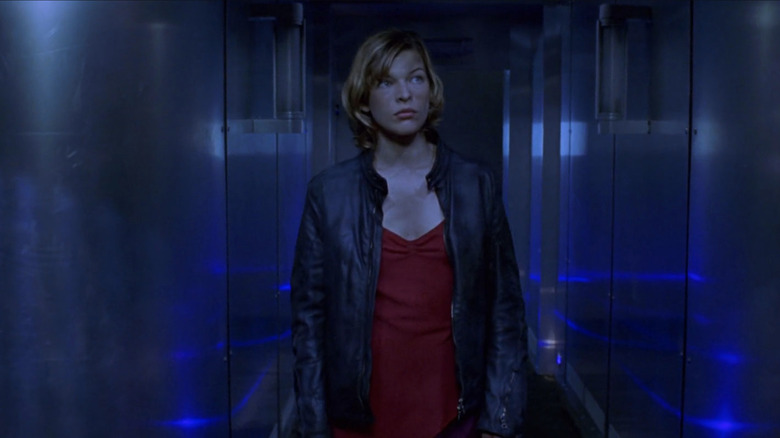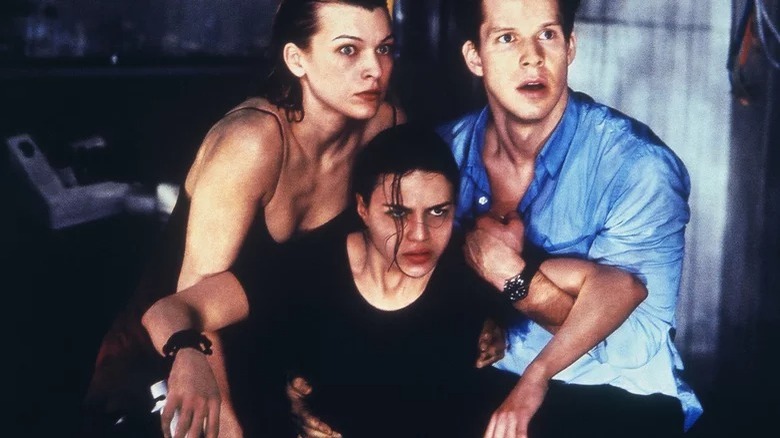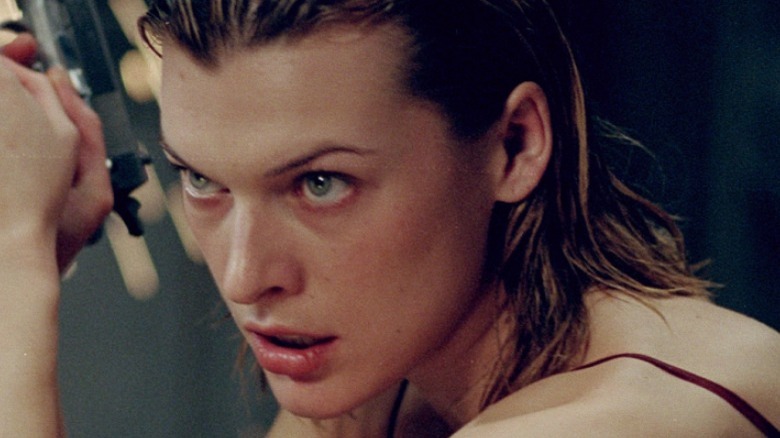Resident Evil Ending Explained: Alice Tumbles Down The Rabbit Hole
Six years after his successful adaptation of "Mortal Kombat," Paul W.S. Anderson wrote and directed "Resident Evil," which was loosely based on the survival horror game franchise by Capcom. While some elements of the 2002 film mirrored certain aspects of the first two "Resident Evil" games, Anderson took the pulp, sci-fi horror route with his first installment in a sprawling franchise. Anderson's "Resident Evil" is trashy in an entertaining way — despite being critically panned, the film was a massive commercial success and praised by audiences for its gory, fast-paced plot. And oh, also, zombie dogs.
The film's protagonist, Alice (Milla Jovovich), has never been a character in the games. In "Resident Evil," she is first introduced as an amnesiac on a quest to learn the truth about her identity, while stuck in an underground facility called the Hive that harbors a terrible secret. Surrounded by commandos of the nefarious Umbrella Corporation, Alice, with the help of a few others, tries to escape and discover what really happened after the T-virus contaminated the Hive. As Alice begins to recover parts of her memory, she realizes that to survive, she'll have to fight tooth and nail.
While the rest of Anderson's "Resident Evil" movies devolve into violent gore and mimic in-game plot points in a haphazard manner, the 2002 film foregrounds its core themes with the need for Alice to survive. This makes "Resident Evil" the closest to the essence of the games, in which the key objective is to survive harrowing conditions that usually involve mutated zombies lunging at the player. But, how does the film end, and what does it mean for Alice's journey?
Waking up alone, not knowing who you are
Paul W.S. Anderson was taking a gamble by introducing the premise of the film through the eyes of a character who was never a part of the games. Hardcore "Resident Evil" fans would perhaps have resonated more with the script George A. Romero had written when he was attached to the project, as it more closely followed the plot of the first "Resident Evil" game. Chris Redfield and Jill Valentine were set to be the leads in Romero's script, with the ending mirroring the "best" ending that a player could achieve within the game. Although Anderson was faithful to the basic beats of the in-game storyline, his decision to make audiences root for a fresh character came with its own risks.
Fortunately, this massive risk pays off. Alice awakens in an abandoned mansion in the midst of a viral outbreak, and her amnesia adds urgency to an already-dire situation. As Alice's identity is directly tied to the truth of the situation, she learns more about who she is along with the audience, which positions her as someone worth rooting for. The Red Queen emerges as the key antagonist in the first half of the film, and Alice is tasked with defeating this sentient AI. After a badass laser corridor sequence that leads to a few character deaths, the power grid is disabled and all the Hive doors open. Enter: feral zombies.
The transformation of Alice from a scared individual bewildered by the horrors that surround her to a gutsy, proactive survivor is the heart of "Resident Evil." We learn more about Alice's direct involvement with Umbrella as the film progresses, and as she arms herself with the truth, she also fights back harder and dirtier, while staying true to who she is and what she represents.
Alice is the only character who truly makes it out
Alice is not the only one with missing memories at the beginning of the film. Spence (James Purefoy) is also clueless when he learns that he and Alice were originally assigned to guard the mansion's entrance. However, when Alice and Spence recover their memories, it is revealed that Spence was the one to steal the T-virus and deliberately release it. Although Spence turns on the group, he is bit by a Licker and Alice ends up shooting his reanimated corpse towards the end of the film.
Matt (Eric Mabius), one of the final survivors, undergoes a fate worse than death. After being wounded by a Licker, the gash mutates, and he is taken away by Umbrella and put into the Nemesis Program. Nemesis is a staple in the games and emerges as an intimidating antagonist — the fact that Matt is unwillingly transformed into an Umbrella henchman drives the tragedy of his character home. Nemesis returns in "Resident Evil: Apocalypse," where he kills surviving Special Tactics and Rescue Service (S.T.A.R.S.) members and only regains his humanity after a fight with Alice.
Then there's Rain (Michelle Rodriguez), a character whose fate is doomed the moment she is bitten by a Licker. Despite being injected with the anti-virus, Rain transforms inside the train car, which still makes for a heartbreakingly horrifying sequence in the film. The tragedy that runs through Rain's fate only highlights the corporate ruthlessness of Umbrella, who view their employees as pawns in their mission to create unethical genetic weapons. The Raccoon City incident occurred due to gross negligence and indifference, which went on to trigger Umbrella's downfall in a fight for individual autonomy. Alice is at the center of this battle, as Umbrella attempts to own/manipulate her throughout, but fails to do so.
Alice is no longer lost in Wonderland
At the end of "Resident Evil," Alice awakens at Raccoon City Hospital, where she has been kept for extensive testing and observation. Being the survivor she is, Alice manages to escape but soon realizes that the entire city is plagued with the walking dead, as the Hive was reopened by the scientists at Umbrella. Left with no allies at this point, Alice gets a shotgun from a police car and walks through the streets, ready to kill when required.
This is a terrific ending to Alice's arc in the first film, as it (somewhat) solidifies the "Alice in Wonderland" metaphor that Paul W.S. Anderson aims for and grounds her as a protagonist willing to fight. Now, Alice has some semblance of who she is and knows who or what to watch out for. Although the next "Resident Evil" sequels grant her superhuman abilities and morphs her character into something unrecognizable, her spirit to fight and topple an evil megacorp remains the same.
Granted, "Resident Evil" is not a film that warrants in-depth analysis, as it simply sets out to achieve thrills, guts, and intense boss fights, and succeeds in doing so. This is pulp entertainment at its finest but lacks the depth, heart, or atmosphere of the video game franchise. That being said, Alice's presence makes these high-velocity shenanigans worthwhile. She's no Jill Valentine, but her character promises a fresh perspective in an otherwise uninspired adaptation, which strays further and further away from the essence of its source material.
This is why the ending of "Resident Evil" is all the more poignant: It is a reminder of Alice's grounded strength and humanity, sans powers or clones. It is a glimpse of a woman who overcomes dreadful horrors and fights to the bitter end.



